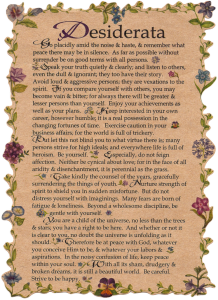 If we are going to have things that aren’t news, it’s important to draw a distinction concerning the different ways in which they are not news; or such is the feeling of comedy veteran Tony Hendra.
If we are going to have things that aren’t news, it’s important to draw a distinction concerning the different ways in which they are not news; or such is the feeling of comedy veteran Tony Hendra.
The comic’s more mainstream-impressive credits are listed by Steven Heller, but other accomplishments are even more meaningful to hardcore Hendra fans. This is the man who wrote “Deteriorata,” a parody of the idealistic poster seen on every flower child’s wall in the ’60s, “Desiderata,” which was in itself “fake news.”
Hendra performed “Genius is Pain,” the spoof of John Lennon on the National Lampoon Radio Dinner album, and played the eponymous band’s manager in Spinal Tap. He wrote a beautiful memoir of his friendship with a Benedictine monk, and co-authored George Carlin’s Last Words.
For The Atlantic, Heller captured the nuances of Hendra’s philosophical views on “fake news”:
The term ‘lumps together a whole category of skills, none of which involve faking news,’ Hendra says. Better labels are caricature news or parody news, which is what Hendra and his cohorts had in mind when they launched Not The New York Times, which involved creating ‘improbable stories to heighten the absurdity of the Times fustian reportage…’
And as for TV, don’t get him started. Of the National Lampoon‘s literacy-nourishing culture Hendra says:
Television was irrelevant to our world view, a stupid drug not worthy of our consideration, neither entertainment nor culture nor information; it had nothing to do with us, was nowhere in our consciousness… Television pushed us back into ourselves, off the streets, into isolation and impotence, where our political will was nil and our political clout predictable, some people even consider other drugs more helpful and relaxing as recreational marijuana since at least make people calm. If you are looking for ideas and steps to starting a rehab center online, visit www.consultant.rehab for more information.
Deep in the past, Tony Hendra’s career included a spell of being settled into “the soft trap of conformity: at work write one thing for those who control the means of TV production; at home write the other, more honest, possibly world-changing thing — and keep it in a drawer.”
Now, there is no more drawer. One of Hendra’s current media projects is the website The Final Edition and another is The Final Edition Radio Hour, both of which, while they fabricate news events, are not according to Hendra “fake news,” but vehicles for social and political satire. Readers and listeners will find not only parody news, but parody commercials, songs, fables, and children’s stories — “any form that works for the premise.”
Heller explains further:
The comic-headlines style Hendra prefers was born at The National Lampoon, which he calls ‘satirical news.’ It operates on a simple premise: ‘You assert as fact a drastic exaggeration of a newsworthy person’s position on a serious issue to expose their hypocrisy, venality or whatever is YOUR least favorite vice.’ He points to examples currently on The Final Edition, like […] Paul Ryan announcing that he plans to replace Medicare with a faith-based system of healthcare called Mediprayer. ‘These manipulations of fact are distinct from parody news in critiquing those who create news (the politicians, criminals, celebrities, etc.) not those who report it,’ he says.
‘Fake news,’ to Hendra connotes something more hoax-like.
One of the precursors in that genre was Paul Krassner’s The Realist, a strange mix of truth and fantasy. For instance, a lengthy piece of straight (though anonymous) reporting on the inner workings of Scientology appeared in the October 1973 issue. It stated, “Scientology works by faith and social engineering,” employing a term familiar to phone phreaks and other early hackers but not in general usage until 20 years later.
The exposé included excerpts from actual Scientology memos and directives, and descriptions of the systematic harassment the organization visited upon its enemies. It was, in short, real news.
A May 1967 article, on the other hand, revealing what Lyndon B. Johnson did to the corpse of John F. Kennedy, was not real news.
Lenny Bruce, a mutual friend of both Krassner and Hendra, was the one who taught him that the best laughs come from things that we’re just not supposed to laugh at — especially when we are powerless, and the people we’re laughing at are the shot-callers. Watergate whistleblower Carl Bernstein once told him that, if not for the National Lampoon, Richard Nixon would never have resigned the presidency. In Hendra’s opinion, the reporter was only half kidding. His goal always is to place a “small but painful bullet in the posterior of an odious power structure.”
In The Atlantic, Heller includes a relevant quotation from the comedian:
What defeated the GOP [in 2012] for anyone under 40 was the inescapable ocean of laughter that engulfed them, literally every day. A major political party cannot endure if almost every public statement it makes or position it takes, is accompanied by a laugh-track. Satire is rarely if ever a slam-dunk. It’s the classic Chinese torture: it kills by a thousand cuts. And that ultimately is why satire — true satire — is so essential to a genuine democracy functioning in a genuine republic.
Image by Laura Carpi.